Che Sarà (What will (it) be?)
Che Sarà (What will (it) be?)
"Che Sarà," the 1971 San Remo Music Festival entry became a mega-success for Jose Feliciano throughout Europe, Asia and South America. “Che sarà” is an Italian song, written by Jimmy Fontana (music) and Franco Migliacci (lyrics). Up until that year, each song was interpreted by two artists or performers to showcase the songwriters' craft rather than the singers' interpretations. The Festival della canzone italiana di Sanremo is the most popular Italian song contest and awards, held annually in the city of San Remo and consisting of a competition amongst previously unreleased songs. It was the inspiration for the Eurovision Song Contest.
Che Sarà
“Che sarà” was sung by José Feliciano and the Ricchi e Poveri group and came second. RCA's Italian producers saw the song and the festival as a way to bring José Feliciano, already an international star, to Italy, as he already knew Jimmy Fontana. Although Ricchi e Poveri was a new, young group, it was chosen to sing the second version after Gianni Morandi, a well known Italian singer and RCA artist, had declined to sing the song. Jimmy Fontana, reportedly, was disappointed by RCA's decision and withdrew from the music business for many years.
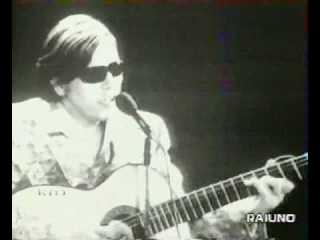
José Feliciano, San Remo, 1971
The lyrics of the song describe the singer's sadness at having to leave his native village (Paese mio che stai sulla collina disteso come un vecchio addormentato; Oh my village set on the hill, lying down like an old, sleeping man) and were inspired by Cortona, a small town in Tuscany where the lyricist, Franco Migliacci, had lived for many years. For Jimmy Fontana, who wrote the music, the song is devoted to Bernalda, his wife's home village.
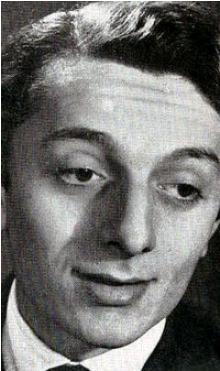
Franco Migliacci
Coincidentally, the Cortona story echoes the personal history of José Feliciano, who was born in the hill village of Lares in Puerto Rico, and who left it for New York, joining many other Puerto Rican migrants to the USA. In fact, the Spanish version of the song is considered by many in the Latino population to be a migrants' hymn.
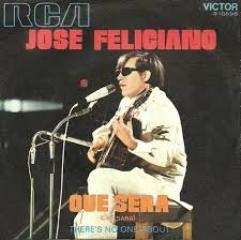
Jose Feliciano - Que Sera (spanish)
Jimmy Fontana (1934 –2013) was born Enrico Sbriccoli in Camerino, Italy, he took the name "Jimmy" from musician Jimmy Giuffre and "Fontana" from an arbitrary name out of the phone book, early in his career. He started his own jazz band, Fontana and his Trio, with piano, bass and drums. At the end of the 1950s, he turned to light music and began his solo career. His hits include "Non te ne andare" (1963) and "Il mondo", which ranked first on the Italian hit parade in 1965. "La mia serenata" won the Disco per l'estate Festival in 1967. At the 1968 Cantagiro summer festival, he sang a cover version of the Tom Jones hit "Delilah", titled "La nostra favola"; the song peaked at second place on the Italian hit parade.
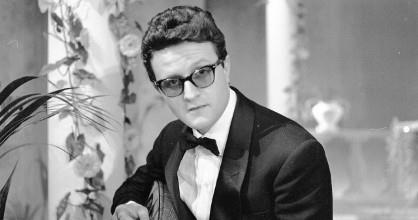
Jimmy Fontana
Ricchi e Poveri (The Rich and the Poor) was formed as a vocal band in 1967 by Franco Gatti, Angela Brambati, Angelo Sotgiu and Marina Occhiena. In 1971, they won second prizes at the Sanremo and becoming one of Italy's most popular groups. In the 1980s, after Occhiena had left the band, the remaining three shifted toward a more lightweight, dance-oriented music. One of Sanremo's regulars, Ricchi e Poveri finally won first prize in 1985 with "Se M'Innamoro."
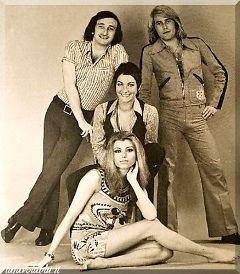
Ricchi e Poveri
Singer and guitarist José Feliciano (born 1945) is one of the best known Hispanic entertainers in the United States and a major star in the Spanish-speaking world. His trademark is his furious guitar work and ability to re-invent rock classics with a Latin spin.
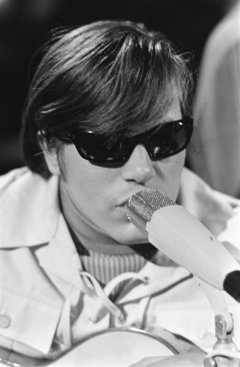
José Feliciano, 1970
José Feliciano was born on September 10, 1945, in Lares, Puerto Rico. By 1950, Feliciano's parents had relocated to a Latino section of New York City's Harlem, where his father found work as a longshoreman. By this time, the young Feliciano was already beginning to develop his enormous talent for music. According to his press biography, "His love affair with music began at the age of three, when he first accompanied his uncle on a tin cracker can." By the age of six, Feliciano had taught himself to play the concertina simply by listening to records and practicing. Later in his career, Feliciano would master the bass, banjo, mandolin, and various keyboard instruments. These accomplishments were more remarkable because he was visually impaired since birth.
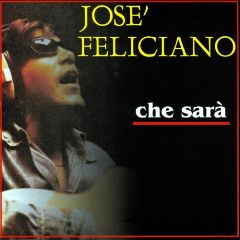
José Feliciano - Che Sara
RCA began marketing Feliciano to the English-speaking audiences of England and the U.S. in 1968, when he released his version of the Doors' 1967 hit, "Light My Fire." His reworking of the now-classic tune peaked at number three on the U.S. pop music charts, selling over a million records and making the singer a celebrity overnight.
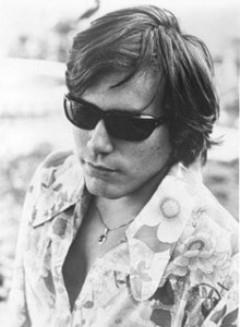
José Feliciano
Feliciano's recorded version of “Che sarà” was successful in Italy, in Central and Eastern Europe, the Middle East and Japan. It was an even greater success in Latin America and Spain in Feliciano's Spanish version, titled “Qué será.” Feliciano's version peaked at number one in Spain. An English-language version titled “Shake A Hand” charted in Scandinavia but not in the Top Tens of the USA or the UK.
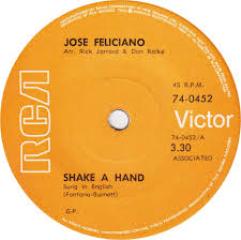
José Feliciano - Shake A Hand
Che Sara, Italian lyrics
Paese mio che stai sulla collina disteso come un vecchio addormentato, la noia, l'abbandono il niente son la tua malattia, paese mio ti lascio io vado via. Che sara' che sara' che sara', che sara' della mia vita chi lo sa, so far tutto o forse niente da domani si vedra' che sara', sara' quel che sara'. Gli amici miei son quasi tutti via e gli altri partiranno dopo me peccato perche' stavo bene in loro compagnia ma tutto passa, tutto se ne va. Che sara' che sara' che sara', che sara' della mia vita chi lo sa, con me porto la chitarra e se la notte piangero' una nenia di paese suonero'. Amore mio ti bacio sulla bocca, che fu la fonte del mio primo amore ti do l'appuntamento come e quando non lo so, ma so soltanto che ritornero'. Che sara' che sara' che sara', che sara' della mia vita chi lo sa, con me porto la chitarra e se la notte piangero' una nenia di paese suonero'.
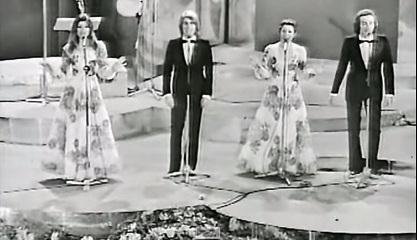
Ricchi e Poveri, San Remo 1971
English translation (nz.answers.yahoo.com)
My country, you're on the hill Spread out like an old man asleep; boredom abandonment nothingness Are your disease I leave my country I go away. What will be what will be what will be What will be of my life Who knows! I do everything or maybe nothing tomorrow you will see It will be what it will be. My friends are almost all away And others will follow after me Sin because I was fine in their company But everything passes everything goes away. What will be what will be what will be What will be of my life Who knows! With me I bring the guitar and if in the night I cry A dirge of country will I play. My love I kiss on the mouth That was the source of my first love I'll give you an appointment like when I do not know But I only know that I will return. What will be what will be what will be What will be of my life Who knows! With me I bring the guitar and if in the night I cry A dirge of country will I play. What will be what will be what will be What will be of my life Who knows! I do everything or maybe nothing tomorrow you will see It will be what it will be.
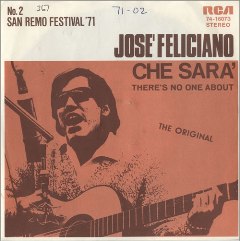
Jose Feliciano - Che Sara 1971








